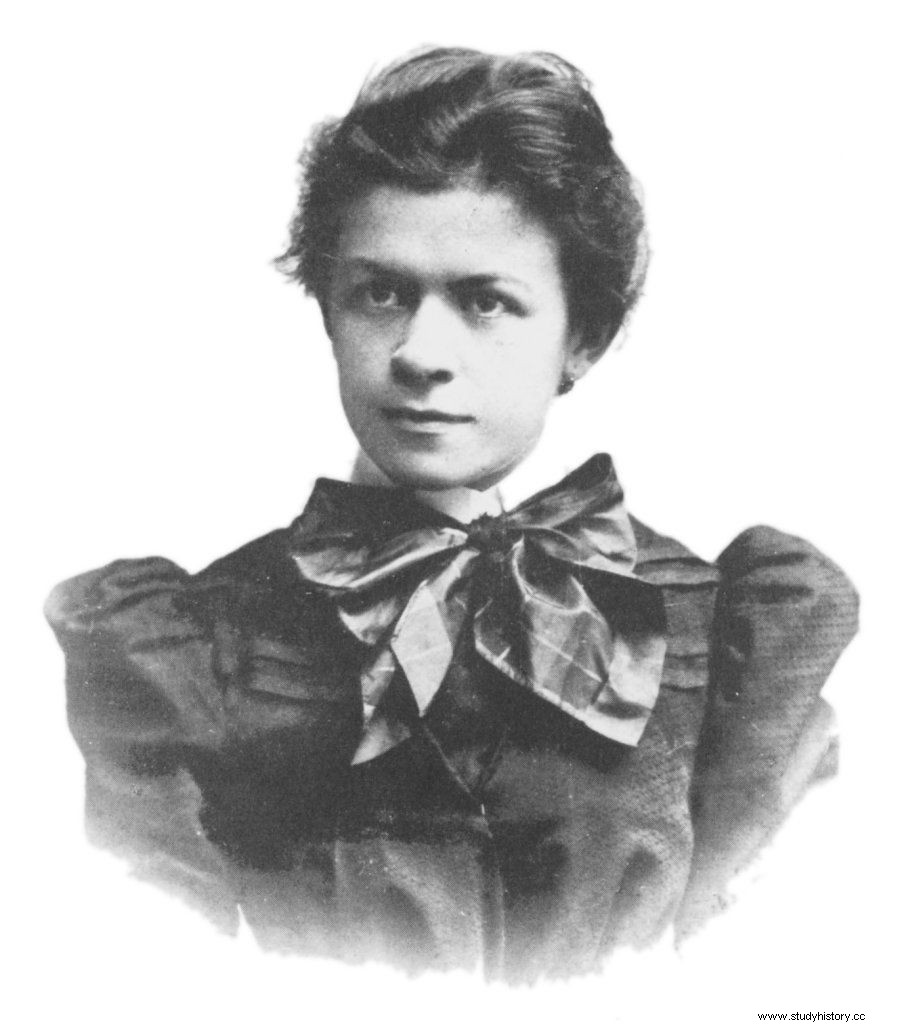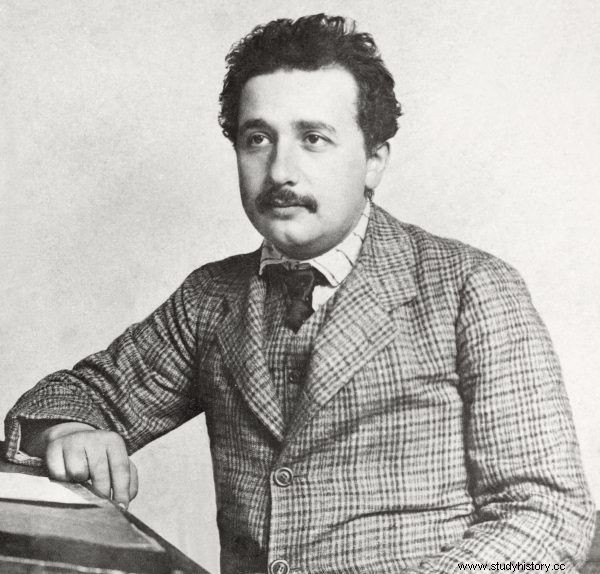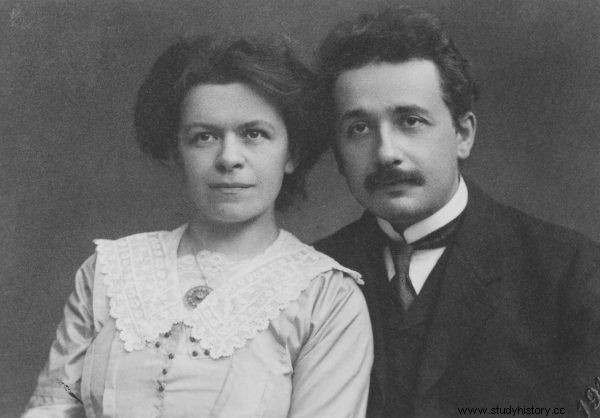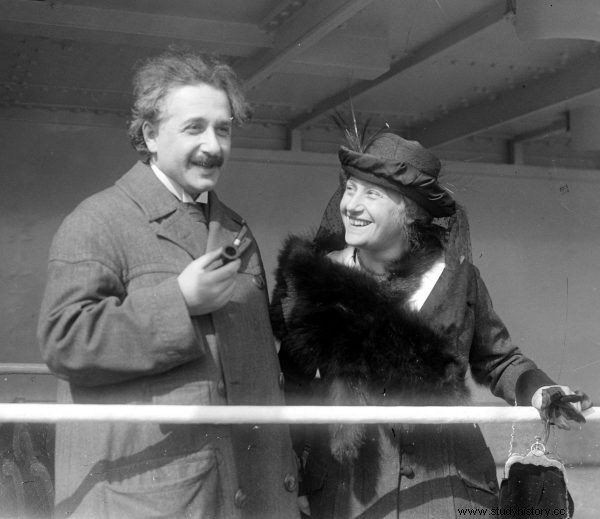He was called a "secular saint", but privately Albert Einstein was by no means a saint. He abandoned his little daughter and humiliated his wife by tormenting her mentally and physically. And he felt that as a genius he could just afford it.
Albert Einstein was awarded the Nobel Prize in 1921. According to an earlier agreement, he transferred the money to his ex-wife, Mileva. It was a modest form of compensation for the violence, betrayal and humiliation experienced by the first Mrs. Einstein. This early, unsuccessful marriage currently arouses a lot of emotion among genius biographers. Meanwhile, during Einstein's lifetime, hardly anyone heard about Mileva Marić. It vanished before it gained great international fame.
Dollie and Johnny
They met while still in college. Mileva immediately caught the eye of her colleague from the group - Albert Einstein. He was impressed with her intelligence and ambition. She seemed to him a woman different from all the others he had ever met. They were inseparable from the very beginning of their studies. Soon they started coming up with affectionate diminutives like "Dollie" and "Johnny" for themselves. He called her a sorceress, and she, 3 years her senior, began to mother him. She borrowed notes, interceded for him with the professors, when he did not appear again at the class, she knitted socks for him and ... waited for a proposal.
She was very short and she was drawn to her characteristic way of walking - Mileva visibly limped due to hip dysplasia. Years after the divorce, Albert Einstein confessed that he married her because he felt sorry for her. No one else, in his opinion, would want this unsympathetic, ugly and lame girl.

Albert later claimed that he married Mileva because he felt sorry for her. Somehow, however, his behavior did not indicate that he regretted the behavior towards her ... Photo of Mileva Marić from 1896 (public domain).
Albert promised her that their marriage would be a partnership, they would work together, create new theories, write scientific articles, win awards. For Mileva, fascinated by the life and achievements of Marie Skłodowska-Curie, it was more than she could have dreamed of.
(Not) forgotten daughter
In the last year of her studies, Mileva discovered that she was pregnant. It was a souvenir of a romantic trip to the Italian Lake Como. Soon, instead of concentrating on formulas and calculations, she had to focus on managing the morning sickness ... In her final exams, she got poor grades to get her diploma. Albert managed to finish his studies. To marry Mileva, all he had to do was find a job quickly. He sent applications to professors of physics all over Switzerland and sought assistantship. Unfortunately! Everyone refused.
Albert's only chance to work was, at least for now, as a specialist at the Bern Patent Office. Mileva returned to her parents, without a diploma, but with a belly and hope that soon everything will change:"Johnny" will get a job, bring her back to Switzerland, get married and it will be just as they dreamed. Marriage became the only option for her child to have a father, and she herself ... a chance for further scientific development, no longer at the university, but during joint research with her husband.
In 1902, Mileva gave birth to a baby girl, whom she named Lieserl. Albert knew his firstborn only from letters. He never saw her. When, after receiving the "dream" job, he finally brought Mileva to Bern, the child had to stay with the grandparents. Switzerland, however, is a conservative country, and an official "farther" (as Einstein called himself) could not risk losing his good reputation . Johnny and Dollie had a modest wedding. There was no family member among the few guests.
The young Eintstein lived modestly. During the day, Albert worked in the office, and Mileva cleaned, shopped and cooked. In the evenings, when he had time to focus on researching the theory, she helped him with his scientific work. It seemed that dreams of intellectual partnership were coming true ... In this first period, the young married woman only lacked a daughter to be happy.
What happened to Lieserl? Her fate is the dark secret of the Einstein family. Perhaps the child died at the age of 2 of scarlet fever, or perhaps he survived the disease, but was adopted. One thing is certain:Einstein did not bring his daughter to Switzerland. His wife, however, never forgot her, even after giving birth to two sons - Hans Albert and Eduard.

Albert Einstein during the "stool fart" at the Bern Patent Office. A boring job was more important to him than his firstborn child (photo:Lucien Chavan, ETH-Bibliothek Zürich, Bildarchiv, public domain).
A brilliant physicist, hopeless husband
The breakthrough came in 1905. Einstein then published as many as five high-profile scientific papers! Among them was the famous material "On the electrodynamics of bodies in motion" published in the prestigious scientific periodical "Annalen der Physik". It contained theorems that would later be called the special theory of relativity. Einstein's name immediately became famous. He received a job offer at the Technical University of Zurich.
The prospect of returning to the city pleased Mileva, who associated it with her student times, the best period of her life. She hoped that the scientific discussions would return, and she looked forward to meeting the researchers. Albert, however, had other plans. He himself was ready to devote himself entirely to science ... but the wife was supposed to take care of the house.
However, Mrs. Einstein's role as housewife did not suit her at all. She was jealous of her husband's standing, his rising fame. She didn't like the fact that Albert insulated her from his academic environment. It also bothered her that other women were writing letters to him ... There were more and more quarrels. Einstein was only a guest at the house, sometimes even for a few days.
But disrespectful treatment is not enough. Currently, there is no shortage of theories that the outstanding scientist not only tormented his first wife mentally, but even ... raised his hand on her. This is how the brutal behavior of Einstein in fictionalized form is described by Marie Benedict in the book entitled "Mrs. Einstein":
I pulled my hands from his grip and pushed him away. He tried to grab me again, but I pushed his hands away from me. We waved our arms for a moment until I felt a strong blow on my face. Cheek. I didn't know if he did it on purpose, all I could think about was the pain.
"Between a pig and the notorious cleaning lady"
Hans Grossman, one of the biographers of the genius, claimed that Einstein had been arrested twice for beating up Mileva. In the protocol of the District Court in Zurich from 1918, the testimony of the genius physicist was recorded:
Our marriage has experienced many disagreement scenes; in these cases, there were also insulting statements and physical violence on the part of the claimant, and I responded in anger with the same.

At one point, Albert and Mileva looked good only in photos ... This image of a married couple dates back to 1912, when the relationship was practically dead, and closeness happened only during fights ... (public domain).
Daughter of Einstein friends from that time , Lisbeth Hurwitz, noted in her diary that she saw Mileva's swollen and bruised face. The reason was allegedly dental problems.
Mileva could not forgive her husband for abandoning her first child and for not fulfilling the promise of joint scientific work. There is also no doubt that Albert was cheating on her. However, his affair with ... his own cousin, Elsa, poured out a cup of bitterness. From the letters of the scientist to this relative and lover, we learn at the same time what he thought about his first wife. Einstein described her as an employee who could not be laid off. Years after Mileva's death, he recalled that she was characterized by the pathological jealousy typical of women of extreme ugliness.
There are many more to Einstein's chauvinistic views about his wife. For example, in a letter to his friend, Professor Meusham, he confessed that his "definition of a good wife oscillates somewhere between a pig and a notorious cleaner."
The humiliating ultimatum
The tension in the Einstein marriage grew after they moved to Berlin, where Albert got a job at a polytechnic university. Elsa lived in this city, so changing her place of residence also meant a chance to meet her mistress regularly. In his letters to her, the genius complained about the cemetery atmosphere in the house. What does Mileva say? She began to think about divorce. Marie Benedict in "Mrs. Einstein" describes the end of the Einstein marriage as follows:
The more passive I was, the more cruel he was, as if he were hoping for an argument that would justify abandonment. One night, in the presence of the boys, he exclaimed, "You suck joy out of everything that happens!"
It got worse and worse. Not only Mileva thought about divorce. Albert also wondered how to get out of the stalemate. However, he wanted to keep appearances. The scandal could hurt him a lot. So before, after more than 10 years of relationship, they decided to break up, the genius scientist had a rather unusual and calculated idea to "save the marriage".

Einstein made bizarre attempts to "save the marriage" and accused Mileva of all the evil in the world. Meanwhile, he himself was romancing his cousin Elsa. Photo of Albert and his second wife from 1921 (public domain).
He gave his wife a special ultimatum. In return for the privilege of being a Mrs. He also required his wife to leave the room they would be in whenever he asked for it.
Mileva was supposed to clean his office, but stay away from the desk. Her duties included washing his underwear and taking care of his clothes. But she could not expect anything in return:the "plan" did not include any going out together or spending time together at home. Moreover, Einstein did not want any criticism from his wife in the presence of his sons.
There was no question of intimacy and tenderness. The couple had separate bedrooms for a long time anyway ... Mileva rejected Albert's humiliating conditions. She preferred the separation and the modest life of a single mother with two children rather than sticking around with her husband who wanted to make her a servant.
They divorced after five years of separation, in 1919. In return for freedom, Einstein promised his ex-wife money from the Nobel Prize, which she would receive in the future. Mileva accepted these terms. A month after the divorce, the brilliant physicist married Elsa.
